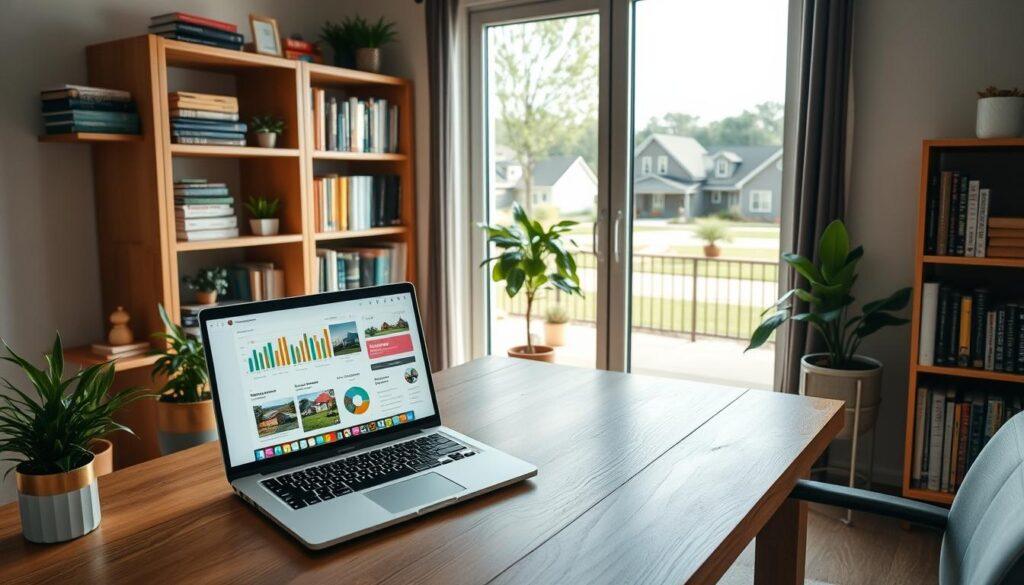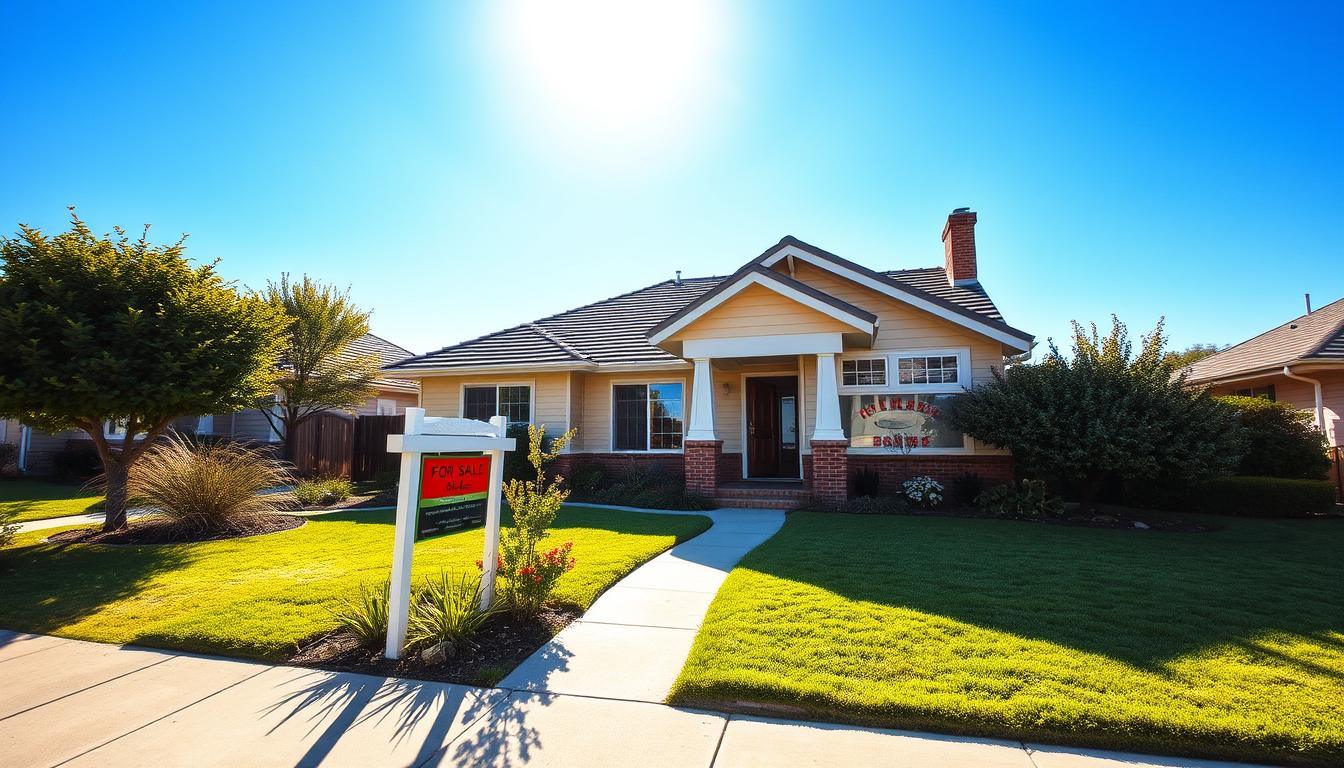Have you ever wondered why more homeowners are choosing to sell their homes without real estate agents? Selling your house by owner, or FSBO, is becoming more popular. It lets homeowners sell their homes on their own, saving on commission fees that can be up to 6% of the sale price.
While selling without a realtor can save money, it also comes with its own set of challenges. This section will cover the basics of starting this journey. We’ll make sure you know how to successfully navigate the FSBO world.
Key Takeaways
- Selling your house by owner can lead to greater profits by avoiding hefty commission fees.
- Understanding the FSBO process is essential to effectively manage your sale.
- Professional photography can significantly enhance your home’s appeal and sale price.
- Utilizing popular real estate platforms like Zillow and FSBO can increase visibility.
- Be prepared for a possibly time-consuming process when selling privately.
- Conducting proper market research is crucial for pricing your home accurately.
- Holding open houses can attract more interested buyers and boost your chances of a sale.
Understanding FSBO: What Selling Your House by Owner Means
Many homeowners find the idea of FSBO, or For Sale By Owner, appealing. This method lets homeowners manage the sale on their own. They can set their own pace, save on realtor fees, and avoid unnecessary costs.
Definition of For Sale By Owner (FSBO)
FSBO means homeowners sell their property by themselves. They handle marketing, negotiations, and paperwork. While it can save money, it also means dealing with the real estate market’s complexities. FSBO homes often sell for less than agent-handled homes, sometimes by nearly $100,000.
Common Reasons Homeowners Choose FSBO
Homeowners choose FSBO for several reasons:
- Cost Savings: They avoid the high agent commissions, which can be up to 5.46% of the sale price.
- Control: They can set their own timeline and control how their home is shown to buyers.
- Direct Communication: FSBO allows direct talks with buyers, making negotiations clearer.
Pros and Cons of Selling Your House Independently
Selling house independently has its advantages and drawbacks:
| Pros | Cons |
|---|---|
| Save on agent commissions, potentially saving thousands. | The responsibility for marketing the home falls solely on the seller. |
| Complete control over pricing and negotiations. | Potential challenges in pricing accurately, leading to missed opportunities. |
| Ability to provide personalized insights about the home. | Limited access to resources and tools typically offered by real estate agents. |
Choosing FSBO requires careful thought. It offers a chance to save money but comes with extra work and possibly lower prices. Homeowners must weigh their desire for independence against the real estate market’s demands to decide if FSBO is right for them.
Assessing the Market: Pricing Your Home Correctly
Finding the right price for your home is key to selling it yourself. A good price attracts buyers and helps you make more money. It’s important to know the market well, starting with looking at similar homes, appraisals, and avoiding common mistakes.
Researching Comparable Sales in Your Area
Looking at similar homes is a basic step in setting a good price. Tools like Automated Valuation Models (AVMs) help by looking at things like:
- Lot size
- Number of bedrooms
- Number of bathrooms
- Recent nearby sales
AVMs give a starting point, but they don’t consider your home’s condition. Real estate agents use Comparative Market Analysis (CMA) for a deeper look. This includes average days on the market, price changes, and sale-to-list price ratios.
The Importance of Appraisal in Setting a Price
A professional appraisal is the best way to value your home. Appraisers look at similar homes and inspect yours, giving a detailed report. This helps set a price that buyers are willing to pay, making your home more attractive.
Common Pricing Mistakes to Avoid
Setting the wrong price can slow down your sale. Mistakes include:
- Overpricing: This might scare off buyers and take longer to sell.
- Underpricing: You could lose money and raise questions about the home’s quality.
- Ignoring market trends: Seasonal changes and buyer behavior should guide your pricing.
Being flexible with your price is crucial. Adjusting based on feedback can help sell your home faster. Tools like real estate comps and CMA reports give you the insights you need for a fair price.

| Pricing Strategy | Typical Outcomes |
|---|---|
| Fair Pricing | Better chance of multiple offers and quicker sale |
| Overpricing | Prolonged market time, potential for multiple price reductions |
| Undervaluing | Quick sale, possible loss of profit |
In today’s market, with low inventory and high interest rates, careful research is crucial. Using expert advice and staying up-to-date on the market can help you sell your home without an agent.
Preparing Your Home for Sale: Get Market-Ready
Getting your home ready for sale is key to attracting buyers and making more money. Good strategies can make your home more appealing and help you stand out in the market.
Decluttering and Staging Techniques
A clean home makes a great first impression. Decluttering can make rooms look bigger and add value. Here are some tips:
- Take out personal items so buyers can imagine living there.
- Organize rooms to show their purpose and feel welcoming.
- Use home staging to highlight each room’s potential, which can increase sales by 13%.
Necessary Repairs and Improvements
Fixing things before listing is important. Problems found during inspections can scare off buyers and lower offers. Focus on:
- Updating kitchens and bathrooms for the best return on investment.
- Simple fixes like painting can add $8,000 in value.
- Professional landscaping can offer a 108% return on average.
The Role of Professional Photography
Good photos are crucial today, as 100% of buyers search online first. Professional photos can highlight your home’s best features. This can lead to faster sales. Homes with great photos get more attention and interest.
| Improvement | Average Cost | Estimated ROI |
|---|---|---|
| Home Staging | $1,500 – $4,000 | 13% higher sale price |
| Kitchen/Bathroom Update | Varies | Highest among all upgrades |
| Fresh Paint | $343 (inspection cost) | $8,000 added value |
| Landscaping Upgrade | Varies | 108% ROI |
By following these steps, you can make your home more attractive to buyers. This effort can lead to a more profitable and efficient sale.
Marketing Your Home Effectively
Marketing is key to a successful private home sale. Using different strategies can make your home more visible and attract buyers. Here are some important ways to market your home well.
Utilizing Online Real Estate Platforms
Websites like Zillow and Realtor.com are great for getting your home seen by many. By listing your home on these sites, you reach a large audience. Sites like houzeo.com and forsalebyowner.com also help with marketing. They might charge extra, but it’s worth it for more visibility.
Engaging with Social Media for Promotion
Social media is a great way to market your home. Share your listing with friends and family to reach more people. Use good photos and consider virtual tours to engage viewers.
Hosting Open Houses and Showings
Open houses let buyers see your home without pressure. They’re best on weekends when people are free. Make your home welcoming and show off its best features. An open house can spark interest and lead to offers quickly.

| Marketing Strategy | Benefits | Considerations |
|---|---|---|
| Online Real Estate Platforms | Broad exposure to potential buyers | May incur listing fees |
| Social Media Promotion | Increased engagement through personal networks | Requires regular posts and updates |
| Open Houses | Allows buyers to experience the property firsthand | Best scheduled during high-traffic times |
Using these marketing methods is crucial for a successful home sale. Tailor your approach based on feedback to attract the right buyers.
Navigating Offers and Negotiations
Learning how to handle offers and negotiations is key for those selling their homes privately. It’s not just about the price. Sellers need to think about things like contingencies and how fast the buyer wants to close. This helps make better choices during the selling process.
Evaluating Buyer Offers: What to Look For
When checking out offers, look at the whole package. This includes:
- Price: Compare the offer to your asking price and what similar homes have sold for.
- Contingencies: Know any conditions the buyer has that could change the sale.
- Closing Timeline: See when the buyer wants to close.
- Financing Details: Find out if the buyer is preapproved and what kind of loan they’re getting.
Buyers often start with lower bids. Being ready for this can help you negotiate better and keep your confidence up.
Negotiation Tips for Sellers
Good communication is key in negotiations. Here are some tips:
- Find out why the buyer wants the house: Knowing their reasons can help you negotiate better.
- Make counteroffers with a reason: Explain why you’re making the offer to guide the negotiation.
- Set a deadline for offers: This can get buyers to respond faster.
- Be open about multiple offers: This can create competition without scaring off buyers.
Being quick to respond and a good listener can really help in negotiations. Quick answers keep buyers interested, and listening well lets you tailor your approach.
Handling Buyer Financing and Preapproval Letters
It’s important to check if the buyer can finance the purchase. A preapproval letter shows they can afford it. But, buyers might ask you to pay closing costs, which can be up to 3% of the price. Knowing your stance on financing helps set the right terms.
Conclusion
Selling your house by yourself can be a smart move and a way to make more money. With the right information and preparation, you can sell your house without an agent. But, you should know the challenges, like setting the right price and handling marketing and closing costs.
Knowing the market well is key to getting a good price for your house. Even though selling by yourself might mean less money, you have more control over the sale. Remember, costs like appraisal fees and lawyer expenses can add up. It’s important to keep track of these while selling your house without an agent.
The journey of selling your house needs hard work and a willingness to learn. If you need help, don’t be afraid to ask for it, especially during tough times like negotiations or closing. By using the tips from this article, you can handle the FSBO process well and sell your home on your own terms.






